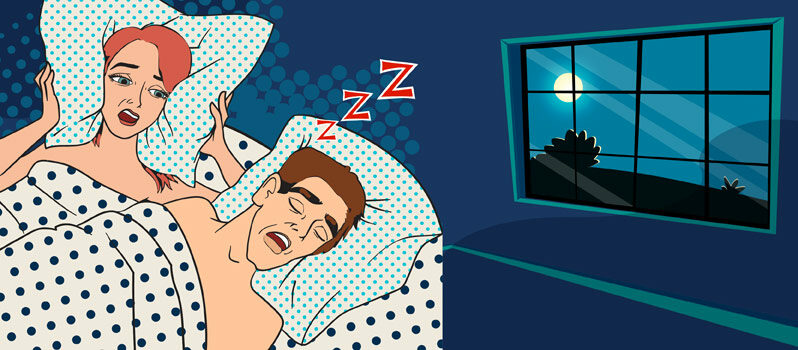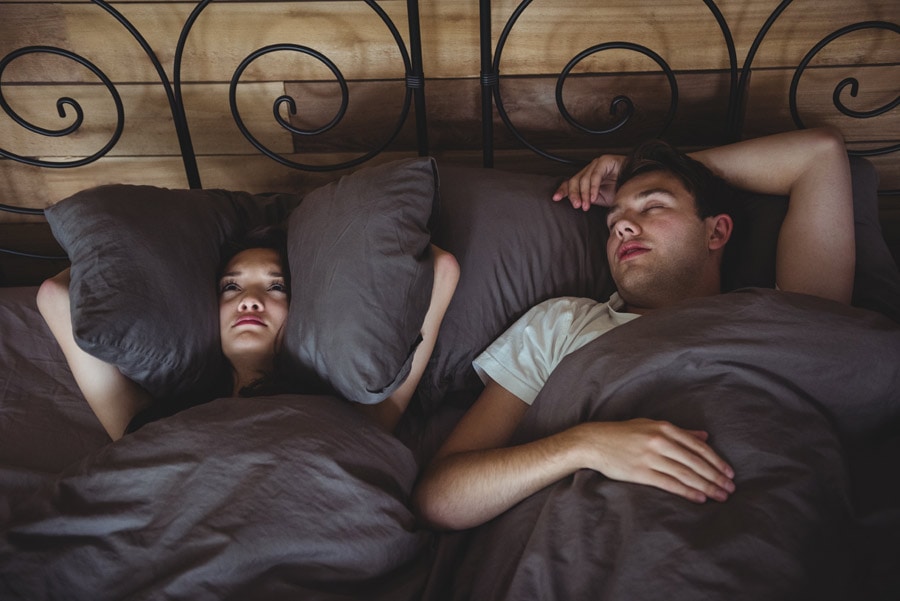Tongue, Mouth, and Throat Exercises that Can Help Relieve Sleep Apnea and Snoring

Your health depends on several fundamental factors. Among them are eating, breathing, hydration, and sleeping, which are fundamental to good health and staying alive! Here, we shall focus on sleeping and the breathing aspect of sleep. The most common sleep issues are related to breathing. They are snoring and obstructive sleep apnea (OSA) which are collectively known as sleep-disorder breathing (SDB.)
Obstructive Sleep Apnea: OSA is typified by a repeated collapse of your airway while you sleep. This results in the flow of air to your lungs being significantly reduced or even stopped altogether. This can repeatedly waken you up, so reducing the quality of your sleep. Medical research has estimated that approximately 20 million Americans suffer from both sleep apnea and chronic snoring. This is associated with being constantly awake during the night and feeling exhausted during the day. Click Here for more information on snoring and sleep apnea.
Snoring: Snoring is another sleep issue related to breathing. The National Sleep Foundation has reported that around 37 million Americans snore, making whistling, grunting, snorting and even noises like a buzz saw regularly. Medical News Today reported that 44% of males and 28% of females between 30 and 60 years of age are affected.
Snoring doesn’t stop you from breathing, but if you snore repeatedly for long periods it will disturb your sleep, plus that of your partner or anybody seeping in the same room as you – and often also those in an adjoining room! Snoring and OSA are often interlinked: OSA can lead to snoring and of those that snore routinely, the American Academy of Sleep Medicine states that 34% of males and 18% of women also have obstructive sleep apnea – or are at risk of it.

While snoring and sleep apnea affect your quality of sleep and that of your partner if you have one, there are some exercises you can try to strengthen your mouth and jaw muscles. These exercises are designed to reduce the slackness that leads to the vibration that leads to snoring and other sounds. Once you know the snoring and sleep apnea exercises you should use them frequently.
There is no instant fix, but exercises do work to reduce the severity and frequency of your snoring. There is no quick way how to stop snoring altogether. It takes time, the same as general muscle exercises take time to strengthen and build up muscles in your body – abs, biceps, etc. However, it is well worth the effort, even if it does take time to reduce your snoring and prevent you from continually waking. It should also be noted that exercises to help stop snoring can also be used to relieve, or at least reduce, the severity of sleep apnea.
You can find more information by clicking on the linked heading above while pressing the Ctrl key. Unless the muscles in your lips and tongue are properly positioned, you may find it difficult to speak properly. A common issue is a lisp, although less common side-effects are airway obstructions, headaches, and swallowing air as you are breathing. The latter can lead to excessive burping. The older you get, the more likely these muscles are to become flaccid and weak. Here is a selection of tongue, mouth, and throat exercises you can carry out regularly. They should take no more than 15 minutes each day. Click here to know more about oral myofunctional therapy.
1. Tongue Curl: Place the tip of your tongue on the back of your upper front teeth. Now curl it backward with its tip in contact with your upper palate as far as you can. 5-10 repetitions should be enough per session. This will strengthen your tongue and also the muscles at the back of your mouth.
2. Tongue Stretch: Stick your tongue out of your mouth as far as you can. Now curl it down and try to reach your chin. Start by holding it as far as it can reach for about 15 seconds. Repeat this 5 times. Each time you do this tongue exercise try to get it out farther and increase the duration every time. This strengthens your tongue.
3. Upwards Tongue Push: Press as much of the upper surface as you can against the roof of your mouth. Hold for 10 seconds then repeat this 5 times. This increases the strength of your tongue and helps keep the soft part of your palate firm and healthy.
4. Downwards Tongue Push: This is the opposite of the upward tongue push. Put the tip of your tongue tight against your lower front teeth. Now push down hard with the back of your tongue against the floor of your mouth. Hold this for 10 seconds then repeat 5 times. This will also help strengthen your tongue and soft palate.
There are also several face exercises you can carry out to help stop snoring and sleep apnea. Here are some of the more effective of these.
1. Open Mouth Exercise: Open your mouth as much as you can. Hold for 5 minutes – and make sure you don’t start yawning or the exercise will be less helpful. Do this every day to strengthen the muscles at the back of your throat.

2. Pursed Lips: Purse your lips tightly then open your mouth. Relax your lips and jaw as you do so. Repeat this exercise 10 times. This exercise tones and strengthens your facial, throat, and jaw muscles.
3. Cheek Pull: Put your right forefinger into your mouth and press on your inner left cheek. Now use your facial muscles to push your cheek back in. Do the same on the other side then repeat 10 times to help your mouth stay closed when you sleep.
Breathe Through Your Nose: Breathing exercises for sleep apnea are important if you want to sleep without snoring and repeatedly waking. Relax your jaw and inhale through your nose with your mouth closed. Then close one nostril with a finger and continue breathing. Do this 10 times while alternating your breathing between left and right nostrils. If one of your nostrils is congested, keep trying to breathe through it. This exercise helps to improve nasal breathing which is important while you sleep. Sleeping with your mouth open almost invariable leads to snoring and disturbed sleep for you and your partner.
Enunciate Vowels: Repeat the vowels a-e-i-o-u 10 times, then say them individually 10 times each. You can change the length of the sounds between rapid and very slow, repeating each sound 10 – 15 times. This helps to strengthen the muscles on the inside of your throat.
Chew Evenly: When you eat, try not to chew just on the one side of your mouth. Chew evenly on either side, and you will not only strengthen your mouth and throat muscles evenly, but you will also be using your teeth evenly on either side.
Singing: Singing exercises several different throat and mouth muscles due to the variety of sounds that your face and mouth are required to generate. A study in 2013 on 127 patients with a history of sleep apnea and/or snoring was carried out in the UK in 2013. This study concluded that snoring can be reduced by singing training. You can read details of this study in the International Journal of Otolaryngology in May 2013. Click on the link to view the details of the study and its full conclusions.
Smartphone-Delivered App: It is possible to use an app to carry out exercises to reduce snoring. This technology is in its infancy, though you can find more information here. An m-Health app has already been developed to enable obstructive sleep apnea patients to carry out exercises by interacting only with their smartphone.
So have these tongue, mouth, and throat exercises for sleep apnea and snoring been beneficial? If carried out regularly, they can be to various extents depending on the severity of the issue. They are more likely to work well with those who have light to moderate obstructive sleep apnea, but perhaps not with snorers. Light snorers will find the most benefit. Research on volunteers in Brazil has concluded that those who followed the exercises above each day for three months reduced their frequency of snoring by 36% and the intensity of their snores by 59% compared to those who did not do these exercises.
The trouble snorers have is that there are many different reasons for snoring. It could be due to the shape of your mouth or tongue, how tight your face and throat muscles are, and the size and shape of your tongue. Overweight people also tend to snore more, often due to the amount of fatty tissue at the back of the throat and nose or the flaccidity of their cheeks and lips. If you snore because you have over-imbibed with alcohol, or have taken sedatives for a medical condition or to help you sleep, then they may have little if any effect. These substances over-relax your back throat muscles.
The above exercises can be used to reduce the strength and loudness of your snoring. They are fairly easy to carry out, but they won’t appear to work for several days, and in some cases weeks. However, they do work through time and persistence is essential. Keep going and you will ultimately notice a difference – and so will your partner. He or she might even stop complaining about you keeping them awake if they see that you are making an effort to overcome the problem.
There are other things you can do to reduce or stop sleep apnea and snoring. Here are the more important of these that may have a beneficial effect.
a) Lose Weight: Many people snore because they are overweight. Losing weight would be helpful because the extra weight may likely also result in excess flesh at the back of your throat and neck. This can, and usually does, promote snoring if not sleep apnea. Also, fat on your chest can compress your ribcage making it more difficult to breathe, while abdominal fat can prevent the correct operation of your diaphragm. So losing weight can work wonders in preventing snoring with such people.
b) Stop Smoking: Smoking can irritate the throat which can partially block the airways leading to snoring. Smoking also increases the production of mucus and can damage the function of the muscles in your upper airway. This can lead to obstructive sleep apnea. There are other effects of smoking that can disrupt sleep, such as disruption of the circadian rhythm leading to fragmented sleep. Stopping smoking will make a big difference.

c) Use a Nasal Strip: A nasal strip is useful if you snore due to partially blocked nasal passages. A nasal strip can help by raising the nasal passages and opening them up. You can then breathe better and reduce the possibility of snoring.
d) Tonsillectomy: Enlarged tonsils can lead to snoring. Your tonsils help to prevent throat and lung infections, but they are not essential. If they are causing interrupted sleep, then you won’t miss them when they are gone! Having them removed to help you sleep better could make life easier for you and your partner.
e) Change your mattress: Check out our best mattresses for snoring here. No mattress can stop you from snoring if you are sleeping on your back. However, a change of mattress can often provide you with a more comfortable sleeping surface so that you don’t roll about in bed trying to get comfortable. A memory foam mattress may also keep you sleeping on your side and not roll over onto your back.
Here are a few of the questions we have received regarding snoring and sleep apnea exercises along with our answers.

At first, you may not see any changes, but do not despair and certainly do not give up! It is generally recommended that mouth exercises should be carried out for 10 minutes each day for 3 months. It is only after this time that you may be seeing results. It takes time, just as it takes time to build up muscles and stamina through exercise. If you can, try to carry them out 3-4 times daily.
Obstructive sleep apnea (OSA) is a condition where the airway is temporarily blocked so that breathing is repeatedly stopped and started during sleep. A common cause of OSA is that the airway becomes blocked due to the excessive relaxation of your throat muscles. For medics, this is generally due to narrowing of the velopharynx. While OSA almost always results in snoring, the reverse is not so. You can snore without blocking the airway.
Definitely on your side, particularly your right side which also helps reduce or even eliminate snoring. Elevated sleeping using wedges or wedge pillows to keep your head and body elevated can be very effective. Back sleepers are particularly prone to snoring. Don’t use two pillows to sleep on – A single, thin pillow will be better.
The exercises above can stop snoring permanently assuming that you carry on with these exercises after dealing with the initial problem. You can probably reduce the frequency of repetitions, although a permanent cure means permanent exercising. If you think it’s worth it then do it!
Certainly not alcohol, and coffee contains caffeine that could keep you awake. We recommend tea. Although the regular black tea leaves contain more caffeine than the same weight of coffee, that caffeine is more difficult to dissolve with hot water than coffee. So brewed tea contains less caffeine than brewed coffee. The best tea to drink at night is chamomile tea which induces sleep. Green decaf tea contains theanine, an amino acid that has calming effects.
Snoring can be caused by a number of factors, although sleeping with your mouth open is a major one. If you sleep on your side your mouth will be less likely to fall open when you are asleep than if you slept on your back. Snoring is also caused by excess flesh at the back of your throat which vibrates causing a noise. A slack mouth and lips can cause snoring, although we have detailed exercises above that you should carry out regularly to reduce the volume and frequency of snoring and then eliminate it entirely. Follow our advice above and you should find that your snoring reduces in frequency and intensity, and ultimately stops altogether if you continue with the exercises.
CPAP is short for continuous positive air pressure. CPAP machines are used for people with sleep apnea and involve a face mask and a pumped air supply into your airway to keep it open while you sleep. If the above exercises don’t work for you, then CPAP might help you sleep at night.
When other methods fail or are intolerable, the adherence of people to using CPAP can be low – as low as 50%. Then, according to a Consumer Report, you may consider surgery such as a procedure to remove excess tissue in the nose, mouth, or throat.
There is no quick fix to stop snoring or sleep apnea, but the advice offered above should help you snore less and reduce or even eliminate sleep apnea with its periodical cessation of breathing. You will find more information on this topic in our post Why Do People Snore.
It is important to stop drinking large quantities of alcohol close to bedtime and to avoid highly caffeinated drinks or any other stimulant before hitting the sheets. If you decide to try these tongue, mouth, and throat exercises for sleep apnea and snoring you must be prepared to continue with them if you want a permanent cure. There is no quick fix!
Donald Edwards is a sleep research expert with a deep knowledge of sleep and sleeping difficulties. He is a senior writer whose expertise and compassionate approach to establishing the fundamental causes of your sleeping issues enables us to help you to get the best night’s sleep possible and wake up fully refreshed for the day to come.
Medical Disclaimer: By using the insidebedroom.com website and/or purchasing any products or services through this website, you are voluntarily agreeing to this Disclaimer. You are agreeing that you have read, understand, and consent to the terms herein.
The information and other content found on this website, or in any linked references, are not intended to be expert medical advice and should not be construed as such. No information on this site, including written text, images, graphics and any other form of information, is intended to be a substitute for professional medical advice, treatment or diagnosis, but is intended for informational purposes only. If you need any form of medical advice or information, then refer to your physician or other medical expert.

Leave a Reply